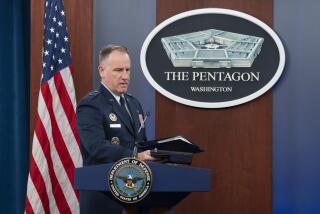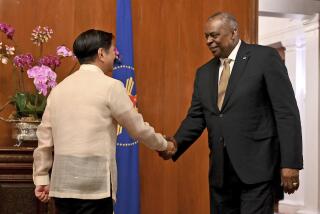U.S. training of Pakistani army to grow
- Share via
WASHINGTON — The Pakistani government has agreed to allow the U.S. a greater role in training its military, part of an accord that will also send counterinsurgency equipment to help Islamabad step up its offensive against militants.
Washington has been watching with growing alarm as Taliban forces have made military gains in Pakistan and U.S. officials have stepped up pressure on Islamabad to do more.
Although the Pakistani military launched an air attack against the Taliban on Tuesday, senior U.S. Defense officials remain deeply worried about Islamabad’s ability to beat back the militant advance.
Long shaped by the threat of war with India, the Pakistani military is armed mostly with heavy weaponry and lacks some of the equipment useful in fighting an insurgency. And after months of fighting, the forces that have been hunting militants are exhausted.
“You have a Pakistani military that is battle weary,” a senior U.S. Defense official said. “Their equipment is aged and not effective for the fight they are in.”
The official, like others interviewed for this story, spoke on condition of anonymity because of the sensitivity of the U.S.-Pakistani relationship.
On his trip last week to Pakistan, Adm. Michael G. Mullen, the chairman of the Joint Chiefs of Staff, continued to press the government to take the militant force more seriously. Pakistani military chief Gen. Ashfaq Kayani outlined for Mullen a series of steps he was planning, including the offensive in the Buner area.
Mullen emerged from his meetings with Kayani and other Pakistani officials deeply worried, telling aides that the situation had grown far worse than even two weeks before, when he had visited with special U.S. envoy Richard C. Holbrooke. “I have never seen him come back more concerned, deeply bothered by what he saw,” a military officer said.
The Pakistani operation included using heavy artillery, helicopters and fighter jets to strike Taliban positions in the mountains beyond Islamabad. But U.S. officials fear that those tactics will be ineffective or could backfire by inflicting civilian casualties. The U.S. military would like to see Pakistan’s military move in light infantry or commando units.
Over the long term, the U.S. military believes training the Pakistanis for that kind of combat is critical for countering the Taliban threat.
But so far Pakistan has only allowed in about 70 U.S. special operations trainers, an effort the American military has long been anxious to expand.
The new agreement would have the U.S. military train Pakistani officers outside Pakistan. The Pentagon has offered to train the Pakistanis in the U.S., but a senior Obama administration official said the location of the additional training had not been finalized.
“The issue now is, how do you do it? Where do you do it?” the senior administration official said. “We are responding to the Pakistani military’s request.”
Until now the U.S. has focused on creating commando forces that can conduct raids and counterinsurgency operations effectively.
“They [the Pakistani military] are struggling to come to grips with the fact that the threat is really within and it is really a threat they helped build and now it has turned against them,” the senior Defense official said.
Although it is not clear what Mullen offered Kayani, he did outline Washington’s plans to dramatically ramp up aid.
“The message has been consistent: We are ready to help in any way you think we can,” the military officer said.
U.S. officials are pushing for Congress to authorize broader American help for the Pakistanis’ counterinsurgency efforts and pushing too for Islamabad to accept the assistance.
The Pentagon intends to pay for an array of new equipment for the Pakistani military, including helicopters, night-vision goggles and better small arms, if Congress approves the administration’s request for $400 million for the Pakistan Counterinsurgency Capability Fund.
Michele A. Flournoy, the undersecretary of Defense for policy, is to testify before Congress today and outline the new initiatives to provide additional training and equipment to Islamabad.
The fund would allow U.S. Central Command to buy helicopters for the Pakistani military while avoiding cumbersome procurement bureaucracy. It was not clear whether the U.S. military would advocate buying new helicopters or refurbishing old ones from Eastern European allies.
The Pakistanis still have some Soviet-era helicopters in their fleet. Another senior Defense official said that in the short term the U.S. military’s focus would be on repairing Pakistan’s broken helicopters.
--
More to Read
Sign up for Essential California
The most important California stories and recommendations in your inbox every morning.
You may occasionally receive promotional content from the Los Angeles Times.










